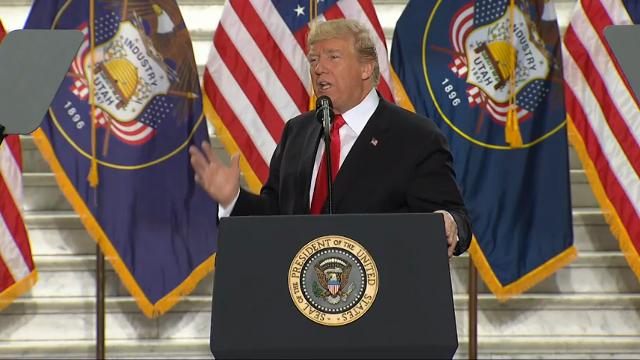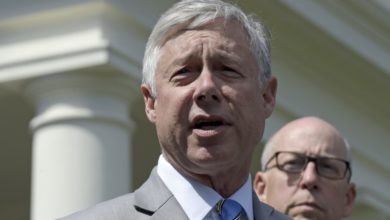
President Joe Biden will restore two sprawling national monuments in Utah that have been at the center of a long-running public lands dispute, and a separate marine conservation area in New England that recently has been used for commercial fishing.
The monuments cover vast expanses of southern Utah where red rocks reveal petroglyphs and cliff dwellings and distinctive buttes bulge from a grassy valley. Former President Donald Trump invoked the century-old Antiquities Act to cut 2 million acres from the two monuments, calling restrictions on mining and other energy production a “massive land grab” that “should never have happened.”
The White House announced the changes Thursday night ahead of a ceremony expected Friday.
Utah Gov. Spencer Cox, a Republican, expressed disappointment in Biden’s decision to restore Bears Ears and Grand Staircase-Escalante monuments, which the Trump administration downsized significantly in 2017. He and other Republicans in Utah called it "disappointing, though not surprising" in a joint statement.
Trump's maneuvers made mineral extraction possible on the land considered sacred to five tribes, including the Navajo, Hopi, Zuni, Ute, and Ute Mountain Ute tribes.
Trump's decision in 2017:Trump shrinks Bears Ears, Grand Staircase-Escalante monuments in historic proclamations
Trump's moves on national monuments:After Bears Ears, Trump administration ponders more changes to national monuments
Tribes and environmentalists Thursday evening hailed the announcement that affects land in Bears Ears, Grand Staircase-Escalante and Northeast Canyons and Seamounts National Monument as a breakthrough on an issue that has clouded the Utah area's future for years.
"Bears Ears Will Be Protected! We applaud expected Biden administration actions to restore protections for Bears Ears and its one-of-a-kind and sacred landscape," the Native American Rights Fund said Thursday in a written statement.
The White House said in a statement that Biden was “fulfilling a key promise” to restore the monuments to their full size and “upholding the longstanding principle that America’s national parks, monuments and other protected areas are to be protected for all time and for all people.”
Former President Barack Obama enlarged the federally protected area in Bears Ears in 2016 near the end of his administration. Trump cut it to about 200,000 acres. His administration also cut Grand Staircase-Escalante by nearly half, leaving it at about 1 million acres. Both monuments were created by Democratic presidents.
Rep. Ruben Gallego, D-Ariz., who has pushed for legislation to undo Trump's action since it happened in 2017, is scheduled to attend Biden's signing ceremony at the White House.
“It’s been great to finally get it to here,” said Gallego, a member of the House Natural Resources Committee. “It’s very sacred and trusted land, and we’re going to preserve it for generations to come.”
Rep. Raúl Grijalva, D-Ariz., who chairs the Natural Resources Committee, said Biden's decision "shows this administration's commitment to conserving our public lands and respecting the voices of Indigenous Peoples. It's time to put Trump's cynical actions in the rear-view mirror."
Utah Republicans had expected Biden to take action after U.S. Interior Secretary Deb Haaland visited the area this summer and recommended the president reverse Trump.
Utah’s governor called Biden’s decision a “tragic missed opportunity.” The president’s action “fails to provide certainty as well as the funding for law enforcement, research and other protections which the monuments need and which only Congressional action can offer,” Cox said in a statement released with other state leaders.
Sen. Mitt Romney, R-Utah, likewise complained about the development, also citing the need for a legislative solution.
"Yet again, Utah's national monuments are being used as a political football between administrations," Romney said on Twitter.
From the Gila River to Bears Ears::Environmental activists renew push to protect Southwest US public lands amid shifting politics
"The President squandered the opportunity to build consensus by working with stakeholders to find a permanent, legislative solution to resolve the longstanding dispute over the monuments' boundaries & management, which would've brought certainty to and benefited all stakeholders," Romney said in another tweet.
Biden's actions were among a series of steps the administration has taken to protect public lands and waters, the White House said, including moves to halt oil leasing in Alaska’s Arctic National Wildlife Refuge and prevent road-building in the Tongass National Forest in Alaska, the nation’s largest federal forest.
But the executive action reflects an inability for the Democrat-controlled Senate to muster 60 votes to overcome a Republican filibuster on any bill to more permanently protect the land. Biden’s executive action means a future president could seek to reverse the protection reinstituted Friday.
Biden’s plan also restores protections in the Northeast Canyons and Seamounts National Monument in the Atlantic Ocean, southeast of Cape Cod. Trump had made a rule change to allow commercial fishing at the marine monument, an action that was heralded by fishing groups but derided by environmentalists who pushed Biden and Haaland to restore protections against fishing.
Protecting the marine monument safeguards “this invaluable area for the fragile species that call it home” and demonstrates the administration’s commitment to science, said Jen Felt, ocean campaign director for the Conservation Law Foundation.
Contributing: Debra Krol, Arizona Republic; Christal Hayes, USA TODAY; Associated Press
Follow Ronald J. Hansen on Twitter @ronaldjhansen.









